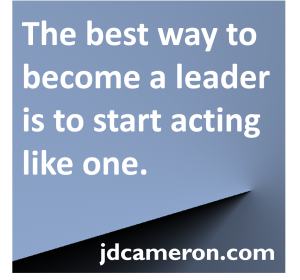So You Want to be a Leader?
 As a 22 year old starting my first professional job as a petroleum engineer, I was surprised that while my boss was in his 50s, his manager was only 26 years old. Talking to other engineers in my department, I discovered that the young hotshot manager barely made the grades to graduate from high school, and had only so-so grades while in college. How did this rather average guy rise so quickly in the organization?
As a 22 year old starting my first professional job as a petroleum engineer, I was surprised that while my boss was in his 50s, his manager was only 26 years old. Talking to other engineers in my department, I discovered that the young hotshot manager barely made the grades to graduate from high school, and had only so-so grades while in college. How did this rather average guy rise so quickly in the organization?
Now 35 years into my career, I look back on that college genius buddy who helped me survive many college assignments, mid-terms, and finals. He could read a chapter just once and fully understand all of the technical nuances. Where is he at his career today? He never made it into a management position. In fact, he never made it out of the lower engineering technical ranks. What does it really take to do well in the business world?
Do smart people make great leaders?
Good grades will open the door of opportunity for a better job, so emphasizing good grades will help college-bound students. Employees also feel the pressure to be an expert as they compete for promotion opportunities and bigger paychecks. But be warned: too much of a focus on being smart comes at the expense of other rather important factors that drive career success.
Think about Leonard and Sheldon, the socially awkward physicists from CBS’s “The Big Bang Theory” comedy show. Yes, they are both funny and endearing, but is that what you want for your own kid’s career? There’s nothing wrong with being smart, but focusing on learning to the extent that social skills are stunted is a very costly mistake. You don’t want to raise the party animal, but you do want a child who knows how to engage and motivate the people around them. Certainly that’s what the business world wants, so let’s take a look at that aspect.
What makes someone a leader?
Why do some people rise in the organization despite their technical brilliance? And why are some people organizationally at the top, but not a true leader? Advice from top leadership experts reveals several common attributes that can make a difference in your career:
| John Maxwell1 |
Patrick Lencioni2 |
Kouzes / Posner3 | Stephen Covey4 |
Ken Blanchard5 |
| Character | Teamwork | Find your voice (values) | Be proactive | Visionary |
| Charisma | ||||
| Commitment | Manage conflict | Model desired behaviors | Begin with the end in mind | Teamwork (buy-in) |
| Communication | ||||
| Competence | Shared accountability | Visionary | Put first things first | Coach / mentor |
| Courage | ||||
| Discernment | Visionary | Engage others | Think win-win | Communication |
| Focus | Organizational behaviors | Search for opportunities | Understand others first | Empathy |
| Generosity | ||||
| Initiative | Communication | Take intelligent risks | Synergize -teamwork | Integrity / Values |
| Listening | ||||
| Passion | Reward & recognize | Encourage collaboration | Sharpen the saw (re-energize) | Empowerment |
| Positive Attitude | ||||
| Problem Solving | Trustworthiness | Strengthen others | Find your voice and inspire others | |
| Relationships | ||||
| Responsibility | Commitment | Recognize contributions | Build relationship trust | |
| Security | ||||
| Self-Discipline | Focus | Celebrate the values, victories | ||
| Servanthood | ||||
| Teachability | ||||
| Vision |
1 The 21 Indispensable Qualities of a Leader: Becoming the Person Others Will Want to Follow
2 The Five Dysfunctions of a Team and The Four Obsessions of an Extraordinary Executive
3 The Leadership Challenge
4 The Seven Habits of Highly Effective People, The 8th Habit: From Effectiveness to Greatness, and The Speed of Trust: The One Thing that Changes Everything
5 The Heart of a Leader
The secret to leadership.
A thoughtful study of the above table reveals that leadership attributes are more about empathy and less about ego. Reading books about leadership will improve your understanding of what it looks like, but knowing what to do and actually doing it are two very different things. Here’s the secret to becoming a leader: start acting like one. That’s the hard part holding most people back.
If you’re in high school or college, get involved in projects, volunteer work, and other worthy activities where you interact with other people. If you are an employee, take every opportunity to serve on a team and hone your leadership skills while improving your behavior and character. When the opportunity for informal or volunteer leadership roles appear, raise your hand high and step up. Don’t fear failure, because that’s a great way to discover what doesn’t work, and what attributes you need to work on harder.
The surprising benefit of leadership
If you follow the advice from the right people, then you will receive a huge bonus that many people overlook. Take another look at the list of leadership attributes, but think about your personal relationships (spouse, friends, and family). Imagine the positive impact you can make with those who you love. Remember that true leadership isn’t about “being in charge of others”, but “inspiring others into taking action they otherwise wouldn’t take”.

